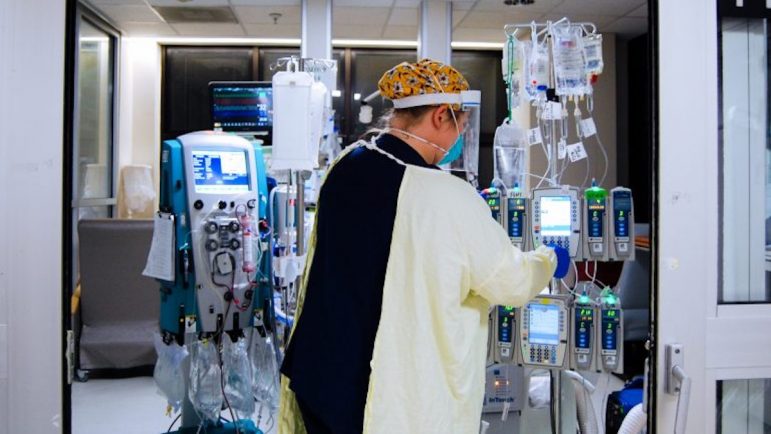For the eighth day in a row, Alabama has logged more than 2,000 Covid-19 hospitalizations — and experts predict that number will continue to rise in the coming weeks.
Those record-high numbers mean hospital staff are being stretched thin, a problem made worse by the fact that many are getting sick themselves.
And as Birmingham-area hospitals see their ICU beds fill with COVID-19 patients, many are starting to provide ICU-level care in other parts of the hospital, such as the emergency room or the post-anesthesia area.
The state reported Monday that 2,286 people were hospitalized with the virus. That’s a sharp increase from just one month ago, when hospitalizations hovered around 1,200 patients. Even at the previous peak in early August, Alabama saw roughly 1,600 hospitalizations daily.
“We expect to easily have 2,500 people in the hospital by the first of the year,” Alabama Hospital Association President Donald Williamson said.
The statewide spike in hospitalizations is being reflected in COVID-19 admissions at local hospitals. For example, UAB reported 150 COVID inpatients on Monday. One month ago, that figure was 79. Children’s Hospital had 13 patients being treated for the virus on Friday, up from four a month ago. Similarly, the Veterans Affairs Medical Center had 24 inpatients Monday, more than double the number it had Nov. 11, when it reported 10 inpatients.
Brookwood Baptist Health, which reported 191 COVID-19 patients across all five of its hospitals, also has seen increases in hospitalizations but declined to break that figure down by hospital or provide statistics on patient numbers from a month ago. Grandview Medical Center reported a “significant” increase but did not provide specific numbers.
Medical West, Noland Hospital in Birmingham and St. Vincent’s all either declined to comment or did not respond to requests for inpatient numbers.
In total, Jefferson County had 520 COVID-19 hospitalizations Monday.
“The hospitals are doing everything that they can do. They’re trying to discharge as prudently as they can and trying to provide the best care they can,” said Julie Cobb, the Jefferson County Health Care Coalition coordinator. “It’s just a bad situation.”
The increase in hospitalizations also means COVID-19 patients are taking up more ICU beds. Of the 1,629 ICU beds in the state, only 152 are available, according to Williamson. That’s just 9%, and Williamson said that dipping below 10% of available ICU beds signifies that the system is under “stress.”
That stress means hospitals will have to make modifications to expand ICU capacity. For example, they may have to reschedule elective procedures, which can include important surgeries such as hip replacements. Or they may have to increase the patient-to-nurse ratio — a measure Cobb said some hospitals are already taking.
The issue is not necessarily finding the space for more ICU beds, but finding additional staff to provide treatment and care to patients.
“(Hospital staff) are stretched because patients who have COVID take more time and require more attention than patients who do not have COVID,” Williamson said. “The second problem is that healthcare workers are getting infected with COVID at high rates.”
Despite the spike in cases, ventilators are not in short supply at the moment. Statewide, Alabama has 1,841 ventilators, and 922 are currently in use. A third of those, or 351 of the 922, are being used by COVID patients. That leaves 919 available.
In fact, Jefferson County has received a couple of shipments of additional ventilators over the past few months, according to Cobb.
Both Cobb and Williamson theorized that one reason for the spike in hospitalizations is “COVID fatigue,” or people neglecting to follow public health guidance as strictly as they once did. Thanksgiving and holiday travel may have also contributed to the recent increase. They urged people to continue to social distance, masks and sanitize their hands.
Hospitalizations could go down in the future if people heed that advice, but Williamson said he is not currently seeing any indication of that. He added that he is worried people are interpreting the recent news of a vaccine as a sign that the pandemic will soon end when in reality it will take several months for the situation to get better.
In the meantime, people should avoid crowds and get the flu shot to avoid being hospitalized with the flu, Cobb said. They can also start doing their own research into the COVID-19 vaccine so that they are prepared to take it when the opportunity arises.
“If you had told me two or three months ago that we were going to have 520 hospitalized (in Jefferson County) today, I don’t know if I would have believed it or not to tell you the truth,” Cobb said. “But that’s where we’re at right now.”

